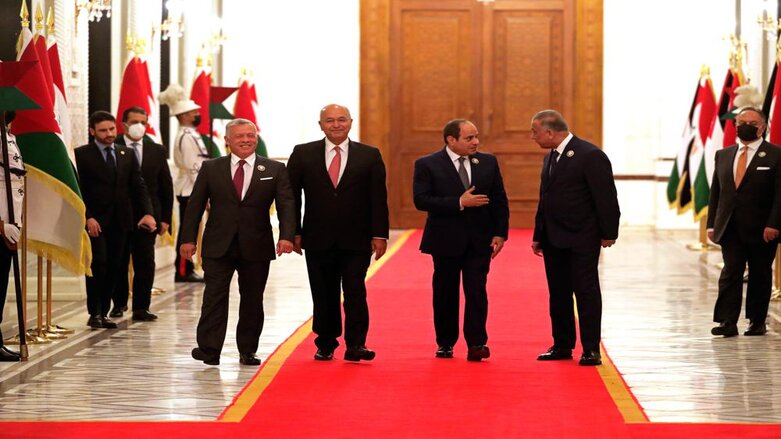Economic and political ties between Iraq and Egypt are growing stronger

ERBIL (Kurdistan 24) – Recent events have shown that economic and political relations between Baghdad and Cairo are growing much stronger.
Last week, Mohamed El-Halboussi, the speaker of Iraq's House of Representatives, headed a high-level parliamentary delegation that visited Cairo. There he met his Egyptian counterpart Hanafi Gibali.
"Egypt is playing a leading role in helping Iraq regain stability and achieve economic progress," El-Halboussi told Gibali, according to a report of the visit by Ahram,
"The Iraqi people have high hopes that Egypt will be a key player in helping Iraq overcome difficulties and move forward on the road of development," he added.
The Iraqi speaker also said that his visit demonstrated Iraq's desire to advance relations with Egypt further.
Gibali pointed out that the delegation's visit comes as bilateral relations between the two countries are making great progress “on all levels”. That wasn't mere hyperbole or diplomatic niceties on his part. Over the course of mere months, Iraq-Egypt ties have grown substantially, arguably the most they have in decades.
Mere days before El-Halboussi led his delegation to Cairo, it was reported that Egypt plans to set up trade exhibitions across Iraq to promote its goods.
Egypt’s Minister of Industry and Trade Nevin Gamea told an Iraqi delegation led by Alaa Al-Agaili, the Vice President of the Federation of Iraqi Industries, how both countries are working to increase trade and that Cairo wants to help Iraq rehabilitate its industrial sector, Arab News reported on September 11.
Gamea explained that Cairo hopes to begin doing so by organizing trade exhibitions in Iraq to promote Egyptian goods and expand cooperation between the countries' private sectors. Specific areas of cooperation she mentioned are machinery, pharmaceuticals, and textiles.
Economic ties between the two countries have markedly grown in recent years and seem bound to grow much more in the near future.
In July, Gamea announced that Iraq-Egypt trade increased by 36 percent in 2020. In that year, both countries exchanged goods and services worth a total of $747.6 million, up from $551.3 million in 2019, which was, of course, before the coronavirus pandemic's debilitating effects on global trade.
Egypt exported $421.7 million to Iraq in 2020 compared to $411.4 million in 2019, a mere 3 percent increase. Such exports are most likely to increase substantially this year if projects like those planned trade exhibitions succeed.
Political ties between the two countries are also expanding. Baghdad hosted a summit attended by Egyptian President Abdel Fattah el-Sisi and Jordan's King Abdullah in late June. That was the first time an Egyptian president visited Iraq in more than 30 years.
A trilateral partnership is emerging between Iraq, Egypt, and Jordan. As a Brookings Institute analysis published in July outlined, Iraq has historically had close economic connections with both countries. In 1989-90 the three countries, and North Yemen, formed the Arab Cooperation Council (ACC). However, Iraq's infamous invasion and annexation of Kuwait in August 1990 saw that partnership collapse before it was able to get off the ground.
Now, just over 30 years later, and with Saddam Hussein’s Baath regime long out of power, it makes sense for Baghdad to again pursue such a partnership.
On September 19, an Iraqi delegation visited Jordan and met with Jordanian Prime Minister and Minister of Defense Bisher Al-Khasawneh who, according to the Jordan Times, "underlined the deep-rooted relations between Jordan and Iraq and his keenness to strengthen cooperation to serve the two countries' common interests."
Furthermore, the Jordanian prime minister referred to Jordanian "King Abdullah's continuous directives that focus on bolstering cooperation with Iraq and the Jordanian-Iraqi-Egyptian tripartite cooperation, which will serve the Arab interests."
By forming such partnerships, Iraq can further diversify its relations with the countries of the region and avoid becoming overly dependent on any one of them, either economically or politically.
For similar reasons, Iraq recently normalized relations with its southern neighbor Saudi Arabia. In recent months, Baghdad has become a mediator of sorts between regional rival heavyweights Iran and Saudi Arabia. Gilbali, the above-mentioned speaker of Egypt's House of Representatives, praised Iraq's role in reducing tensions and promoting reconciliation in the volatile region.
In light of all these noteworthy developments, a tripartite Egypt-Iraq-Jordan economic and political partnership may finally realize its potential in the foreseeable future.
-- Paul Iddon
